- Home
- Adele Griffin
The Unfinished Life of Addison Stone Page 13
The Unfinished Life of Addison Stone Read online
Page 13
LUCY LIM: Look, I’d never even met Zach Frat till that night! That’s how fast he’d been in and out of Addison’s life. But I recognized him, and of course I knew who Sophie was. I knew how hard it was for Addy to have to deal with Sophie, who’s such a mess that it almost presents itself as awesome. She’s the kind of actress whose best role is playing herself as this tragic victim of her own fame, and she’s got that whole blank-stare thing down pat. Addy could never be like that. Addy didn’t play at being Addy. She was always hyper-real. It seemed like a cheap trick on Zach’s part.
But I wouldn’t have guessed how that night would roll out. I’m never on the side of the guy who throws the first punch. Not at funerals, and not at parties. I thought Lincoln was the coolest dude on the planet, right up to that second when he punched Zach in the mouth.
MARIE-CLAIRE BROYARD: It was like a crime scene. Who knew all that blood could come gushing out of a nose? There were even drops of blood on my shoes! The way I saw it, Lincoln knew that Addison was getting emotional about Sophie, and so he just charged at Zach. Darling, I’ll always be Team Zachary; I’ve known him since we were seven years old and we took ballroom dancing class together. Zach’s no street fighter. And that night was horrifically embarrassing for him.
Lincoln’s known to be edgy—I mean, his art is deeply awful, don’t you think? Those poisoned, gruesome people? Those apocalyptic, end-of-days visions? Though I did hear that after Addison died, Lincoln—maybe out of guilt—went on some spiritual journey, and now I hear he’s re-identifying himself as a shaman. But quite honestly, I never think you lose that core of self that’s the real you from birth. Lincoln’s core is dark. Which is why Addison loved him. Because she had her own demons. Anyway, I thought Lincoln was nothing but a little shit that night. Violent, stupid, immature—and I told him so.
LINCOLN REED: Why’d I punch Zach? For one, I was showing off. For another, I’d trained as a boxer for years—my mom had a string of boyfriends after Robard, and one of them owned a gym in Sag. I knew I could throw a real punch. It was wrong of Zach to bring Sophie. It destabilized Addison. It pissed me off. It made Sophie feel used. All I wanted was to ring in New Year’s Eve with my girl, for God’s sake. But I ended up creating more stupid drama, so my bad.
New Year’s Eve, that’s supposed to be a perfect night, right? In my pocket was this onyx-and-silver pendant I’d designed especially for her.
The press made Zach out to be this jackass who deserved it. But I was just as much to blame. The way the newspapers talked about that incident, I think it all contributed to Zach’s behavior toward Ads afterward. So that makes me responsible, too, right? Because I was the one who cut the power on Zach’s pride.
And I paid for that.
SOPHIE KIMINSKI, WHO DECLINED to be interviewed for this book, is a Canadian actress who is still best known as a regular cast member on the popular Canadian television drama In the Soup, where from age nine through fifteen, she played the roles of identical twins Sammy and Frankie. In recent years, her career as an actress has been eclipsed by her substance abuse problems, which have often made her the focus of tabloids and paparazzi.
MARIE-CLAIRE BROYARD: Do you want to know the other horrendous part of that night? New Year’s Eve was also the moment that Addison found her new BFF. You know who I mean, right? Gil “DJ Generate” Cheba? Now that boy is a disreputable character.
ARN: You go out quite a lot, and you’ve become pretty friendly with some of the fixtures of New York nightlife … Marie-Claire Broyard, for example. And Gil Cheba. These people are known for having a certain style.
AS: I think certain artists respond to style. We all live in a swamp of influence. I’m influenced by thirty million things a day—the weather, if I ate something delicious for breakfast, a book I just read, the edgy-looking couple that I saw in the subway. But because I paint portraits, of course I’m influenced by personal style, too. Gil and Marie-Claire have a New York style that knocks me out. As do the fabulous Nortons, Alexandre and Stephanie. As do the Lutz brothers.
But I also like to paint strangers. I love that I never know who I’m going to meet next in New York. Sometimes I imagine all these millions of kids who have come here like jeweled doorknobs marked “turn me.” It’s an Alice-in-Wonderland kind of city.
Gil Cheba has a facial architecture that makes you want to look twice. I want to wait till I’m a better painter before I paint him. He has so many options and moods, and he exposes so much of his soul. He’s an open person; he doesn’t have barriers. I know people have their issues with Cheba, but if I listened to anything people ever told me about anybody, I’d be in Peacedale, married and having babies while my soul collapsed. I just know that’s true.
Excerpt from ArtRightNow interview with Addison Stone.
LUCY LIM: One night, it was sometime in January, Addy calls me from New York, and she’s crying. Really sobbing.
“Somebody’s trashed my studio.”
“Trashed it?”
“Destroyed, Lulu.”
“What? What are you talking about?” I’m shouting into the phone. I can’t believe what she’s telling me. I can barely understand what she’s saying, she is crying so hard. Addy’s not a crier. But what I finally got out of her was that someone had broken into her workspace in Chelsea and ruined everything. Her sketches, charcoals, studies, and this portrait she’d been working on, a portrait of her mother, another of Lincoln. Works she’d never inventoried, things she’d never reproduce.
“I’m sure this is Zach. Or one of Zach’s hired goons,” she said.
“Don’t jump to conclusions, Addy.”
But Addy was sure that Zach had done it as payback—and all because Lincoln had thrown that punch.
OZO FRATEPIETRO: My wife made my name famous. I myself have very little to do with the art world. Carine and I divorced several years ago. I make my home half the time in Paris, and the other half in Montepulciano. My soul is Tuscan. It is where I go to disappear.
One night, I get a call on my private phone. This private phone line, it rings maybe four times a year. It is the girl Addison Stone. I recognize her name. I know that my ex-wife is compelled by her art and thinks she is some kind of a genius. I know that she has been in a volatile relationship with my son. But I myself have never met this girl. How does she even have this number?
What Addison Stone said on the telephone about Zachary … these things are not repeatable or printable. It is hard to communicate the disrespect of her diatribe. She was threatening me. Her belief was that Zachary had destroyed her artwork and her livelihood.
I hung up the phone and considered calling the police. Then I thought better. I would not stoop to her level. I am not a child.
ERICKSON MCAVENA: She was biting and snapping at everyone. I heard she even got hold of Zach’s father—ha, I’d loved to have eavesdropped on that call. I’ve got no extra knowledge on whether Zach himself was to blame for all that monkeyshines with Addison’s studio. But Addison was one hundred percent positive and bent on revenge.
Around that time, if Addison wasn’t over at Lincoln’s, then she’d be with Gil Cheba, either outside on the fire escape or in the shared courtyard space, so that Gil could smoke. I never let him smoke in the apartment. Or, if it was too cold, they’d be heads-to-tails on our velvet sofa, drinking some nasty cocktail they called “rummy-dums” that Gil’d brewed up on our stove. Rum, butter, cloves. Simmer for seventeen hours. They’d drink and plot. And that was no good, for Addison, since one tablespoon of rum could just about knock her sideways.
I’d come home and say, “How’s the diabolical master plan to kill Zach going?”
And they’d play all innocent. “We weren’t talking about Zach.”
And I’d say, “That’s not possible. You two are always talking about Zach.”
And then they’d both look guilty as a three-dollar bill.
That month is the only example I can give from Addison’s life where she was wasting time. And i
t was all Gil Cheba. Wasting his own time, and everyone else’s he could pull down with him.
Gil Cheba and Addison Stone in Brooklyn together, winter, courtesy of Erickson McAvena.
LINCOLN REED: Nothing about Gil Cheba washed right. Growing up around artists, I’ve seen too many of them lose to alcohol and drugs. Those anti-psychotic medications, the kind I knew Addison was on, just don’t mix with recreational habits. Cheba is also known as a “connector”—somebody who can get you Cuban cigars or guns or your own personal harem.
He swore to everyone he’d cleaned up, but everything about that guy smelled like an addict to me. He could rationalize and simplify and excuse everything. It killed me that Addison was intrigued by him. She always liked the brink, and anyone who was standing on it. She knew he was dangerous. Gil was exhausting to be around, even though he didn’t do anything much, he always wanted to distract himself—sex, booze, chatter, parties, music, feuds. The guy had no impulse control. But where Addison saw a charismatic renegade, all the rest of us only saw a bad seed.
ANONYMOUS: You already know I met Stone through Cheba. Me and Cheba, we’ve been buddies for years, from old days, way back. Not to get too much into the background of who I am, but what I like to say is I’m an upstanding, can-do guy working on the other side of the law. Call me a revenge handyman. I get shit done, and not for cheap.
The night we met, I liked Stone right away. She did not fool the fuck around. She says to me, first thing, “You gotta torch this house for me.”
“Sure, I’ll do it. For a price.”
“Name it,” she says.
Turned out to be a guest cottage on a piece of property out in Wainscot. That’s a pretty big job, but doable.
Stone said, “I’ve got the cash.” She was not intimidated, this one. She wasn’t a pushover. She wanted to video-record the whole thing, too. When I said that’d cost extra, she told me, “I’ve got all the extra you need.” It was a risk. But yeah, I did it. Pretty clean job, in the end.
ZACH FRATEPIETRO: Look, I can only go into this so deep. Our family has been advised not to get into conversations about Cloud Walk, since we’re working on a settlement with Addison’s estate. But I got that call at about 2 A.M. from my mother. Who got the call from our groundskeeper, the police department, and the fire department.
Treetops Cottage was one of three guest houses at Cloud Walk—that’s our family estate in the Hamptons. It had been burnt to a crisp. Arson. Nobody was there at the time. I knew who’d done it. We all did.
The funny thing is that I knew I wouldn’t press charges. I might have made threats, but burning down that house was Addison’s demented love letter to me. You want to know something I never told anybody? Treetops was the very same cottage where Addison and I had stayed for a weekend last summer, over the Fourth of July weekend. The place was symbolic to her.
MARIE-CLAIRE BROYARD: The whole game of escalating revenge between Addison and Zach was crucial for Zach. It was the way he could stay in Addison’s life. In contrast, Addison was excited by the by-product of her revenge, which was performance art. I’m sure she also enjoyed the spectacle of burning down Zach’s family’s property. It was interesting, brutal, destructive, dramatic—and not much to do with Zach at all.
But Zach couldn’t see it that way. He took her rage personally. He saw their feud as a way to keep Addison close to him. The way a naughty child doesn’t mind what kind of attention he gets, as long as he’s getting it. In this sad, sick way, he loved that Addison smoked the guest cottage. He thought it meant he mattered.
From: Addison Stone
Date: Jan 29 at 1:29 AM
Subject: further to ZF
To: Lucy Lim
You know what it is, Lulu?
I never expected that cool-as-a-martini Zach Frat would be so stupid & useless.
I thought he’d go away quietly.
Thought he’d stop thinking about me right when I stopped thinking about him.
At precisely the moment I did.
Which was unrealistic and possibly flat-out dumb and maybe even cruel of me.
I never understood how deep he went with me.
How lost he was without me.
Not until he began all his reindeer games.
Now I hardly remember when or what was good between us.
It’s just cat and mouse. All I’m doing is waiting Wondering, watching my back.
He’ll nail me for arson, maybe. If he finds the fingers that are pointing back to me.
All I can tell you, I hope he doesn’t think this game has any rules.
Because it doesn’t.
Addison and Lincoln at Kolber Gallery, courtesy of Kolber Gallery.
IX.
“I’M BLOOMING, FINALLY.”
ERICKSON MCAVENA: Our lease was up in August. By February, Teddy was spending most of his time on Court Street, and Addison was usually at Lincoln’s place in Soho. So the obvious future was for her and Lincoln to feather their own love nest, and for Teddy to take over Addison’s rent. Addison and Lincoln were stupid for each other those days, besides.
“You remind me of a pair of baby orangutans,” I used to tell them.
Just the way they’d sit on the couch, her legs flung over him, her fingers in his hair, and he’d be nuzzling her neck—this wreck of limbs, like they might start picking mites off each other’s skin or digging their fingers up each other’s noses any minute. They only wanted to breathe each other’s oxygen.
Was I the only person who could feel this dust storm of doom kicking up around her? Addison was giving the world her story of a shiny-eyed artist in the big city. But if you scratched that surface, you had a wild kid zooming around in too many directions. Here was a girl who’d just hired an arsonist. A girl who’d dropped all her spring classes and who wouldn’t even be getting her GED. A girl who never saw what was wrong with stealing—in fact, who felt a kind of Robin Hood ethical rightness in theft.
I liked to think I was good peeps for Addison. But Max Berger, Gil Cheba, even Marie-Claire—this wasn’t always a thoughtful posse. Addison could get confused about the candy-ass image of a person versus the hard truth. She’d made that mistake with Zach. She’d made that mistake with Berger. And now here she was caught up in Cheba’s whole “I’ve been to the edge” British bad-boy thing. What they’d say down South about Addison is she was a girl who could get her head turned too easy.
I kept on her about the five-finger discounts. The Bergdorf prank had made her bold. But the claw-foot bathtub was over the top, even for her.
“You’re dumber than a sack of hammers,” I’d tell her.
“Heists are fun,” she’d answer. “They take my mind off my problems. Whoever is dumb enough to buy that tub is dumb enough to buy it again.”
“Yeah, but this is about you. And one day, you’ll get caught,” I warned, “and there won’t be any Max Berger to do the damage control so that you come off all cute and respectable in Mirror Mirror.”
She wasn’t listening. She never listened.
MARIE-CLAIRE BROYARD: Did you know Addison and Gil dressed up as FedEx workers to steal the tub? Once she had it, she had it hauled the five flights up to the Court Street apartment, then filled it with plantings—forsythia bushes and a mulberry tree. It looked wonderful.
The tub’s still at that old apartment. It’s too heavy to move. Here’s something sentimental—I went into Brooklyn just the other week to see it. Kind of a pilgrimage, to the old apartment where so much of Addison’s spirit is contained. The tub is right where it always was, in front of the living room window and still filled with greens.
“Addison Stone stole that tub,” I told the couple who are renting there now. They just about lost their minds, they thought it was so fabulous.
MAXWELL BERGER: These mind games—Zach Frat destroying Addison’s sketches, Addison burning down his guest cottage in the Hamptons—they might have been selling copies of The New York
Post, but they weren’t helping Addison’s career.
I called her. I never make calls, but I called her. I said, “You get your act together. You’re disappearing onto the front page. Commercial is one thing. Flame-out’s another.”
ARLENE FIELDBENDER: Addison and I met for lunch in late January. I took off from teaching especially to come down and see her. By then, she’d dropped all her art classes for that spring semester. I hadn’t given her any push-back when she decided to stop the general curriculum. But the art classes? That was shortsighted to the point of stupidity, and I told her so.
We met at her studio. I saw the finished Doc and some of her studies that would be Exit Roy. And I saw some sketches for her self-portrait. Her portrait work was leaning more deeply to abstraction, and she was working in watercolor. The work was emotional and poignant, though I noticed she was discarding a lot of it. Most of her studies in butcher-block paper, she’d made big slashing black Xs through the faces. She was too quick to edit and negate. Too hard on herself, I thought.
Addison herself was a little off, as well. She was bouncing in too many directions. During lunch at a coffee shop around the corner from her studio, she gushed all about how she was in love with Lincoln Reed. How she couldn’t live without him. How he was everything to her. But then in the next second, she’d flash to anger. Zach had destroyed her studio. Zach was out to get her. She went through an itemization of all that she’d lost.
Her brain then seemed to spiral naturally to the Coulsen article. I admit it was unsettling. Addison was always a mile a minute, but throughout the lunch, she couldn’t seem to stay on point in conversation. I was concerned that she might need more intensive psychiatric help. A reassessment. I came back to Peacedale and told Bill I was a bit worried that Addison was losing her grip on her future. She seemed overly distracted by relationships.

 All Pets Allowed
All Pets Allowed Witch Twins Series
Witch Twins Series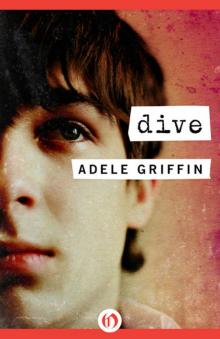 Dive
Dive V is for...Vampire
V is for...Vampire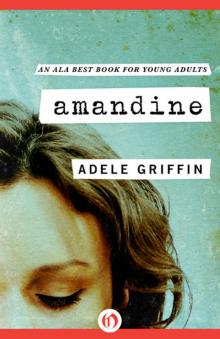 Amandine
Amandine The Knaveheart's Curse
The Knaveheart's Curse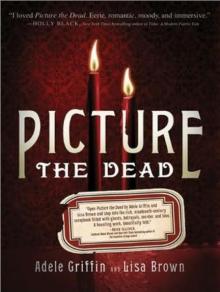 Picture the Dead
Picture the Dead My Almost Epic Summer
My Almost Epic Summer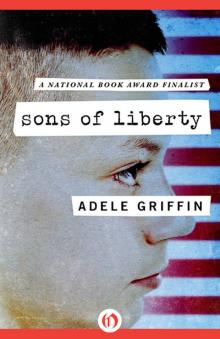 Sons of Liberty
Sons of Liberty Overnight
Overnight Witch Twins
Witch Twins Witch Twins and the Ghost of Glenn Bly
Witch Twins and the Ghost of Glenn Bly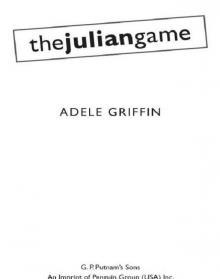 The Julian Game
The Julian Game Other Shepards
Other Shepards Split Just Right
Split Just Right Vampire Island
Vampire Island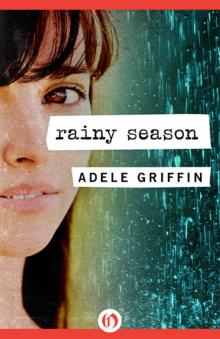 Rainy Season
Rainy Season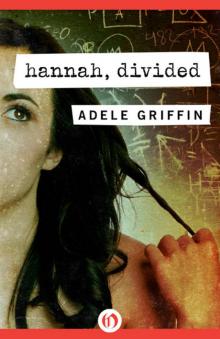 Hannah, Divided
Hannah, Divided Where I Want to Be
Where I Want to Be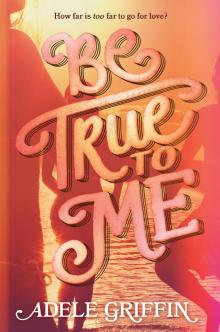 Be True to Me
Be True to Me Witch Twins at Camp Bliss
Witch Twins at Camp Bliss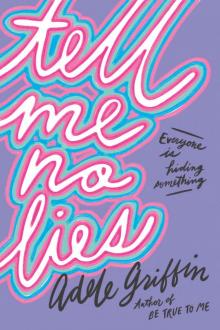 Tell Me No Lies
Tell Me No Lies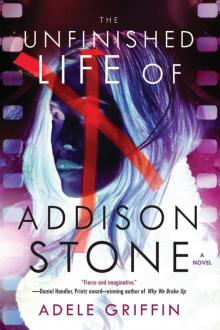 The Unfinished Life of Addison Stone
The Unfinished Life of Addison Stone